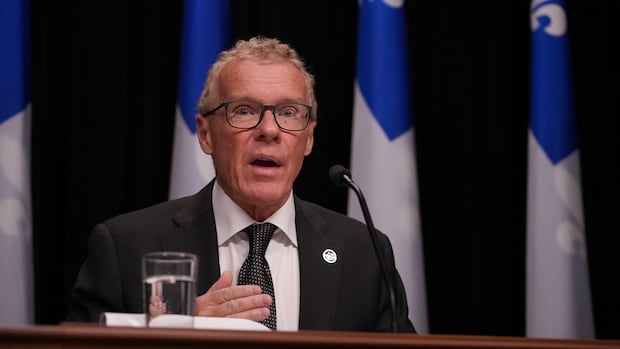MontrealQuebec’s Labour Minister Jean Boulet tabled a bill Thursday meant to increase transparency within unions, but union leaders are already coming out saying the legislation amounts to interference in their internal affairs. Labour minister says bill meant to increase transparency within unionsListen to this articleEstimated 4 minutesQuebec Labour Minister Jean Boulet says Bill 3 is meant to defend the interests of employees, but unions are pushing back saying it interferes with their internal affairs. (Sylvain Roy Roussel/CBC)Quebec’s Labour Minister Jean Boulet tabled a bill Thursday meant to increase transparency within unions, but union leaders are already coming out saying the legislation amounts to interference in their internal affairs. Bill 3 notably divides union dues into main and optional contributions, the collection of which must receive the support of a majority of members in a vote held at least annually. Once members approve of the union’s optional dues, they cannot individually opt out of them.The bill also outlines activities that would exclusively be funded by optional contributions. These include presenting legal challenges over the constitutionality or validity of a law, running ad campaigns or participating in social movements. These activities do not “directly concern the negotiation or application of a collective agreement,” the working conditions of employees or a union’s “rights and obligations in the normal course of its activities,” according to the bill.Speaking at a news conference Thursday morning, Boulet said the central mission of unions involves representation, negotiation and providing training.”Everything peripheral to that becomes optional,” he said.WATCH | What does Bill 3 mean for workers’ rights?:Quebec wants part of your union dues to be optional. Is it an attack on workers’ rights?Some unions in the province are accusing the Coalition Avenir Québec government of assaulting workers’ rights with a new bill that would alter how they collect member dues, how they could spend funds and how transparent they are with their members. Bill 21 challenge, Dubai trip among justificationsEvery time a union wants to stage a “peripheral” activity, it would need to put the funding for that activity up for a vote — something the president of the teachers’ union the Fédération autonome de l’enseignement (FAE) calls restrictive. “It’s clear interference in union affairs,” says Mélina Hubert, adding that she believes the law is rather meant to “silence” opposition to government policies than support employees.The FAE, for instance, is currently challenging Quebec’s secularism law — which forbids teachers from wearing religious symbols at work — before the Supreme Court.Boulet named that challenge along with FTQ president Magali Picard’s trip to Dubai to attend COP 28 talks in the middle of a labour dispute as part of the circumstances that justify the need for the bill.”We’re not pursuing some unrelated social cause,” said Hubert. “There are teachers that are targeted by this law, teachers that don’t have the same rights as everyone else, that are victims of discrimination in the workplace. That’s what we’re talking about.”Boulet also wants unions to be more transparent. Those representing more than 200 members would have to present an audited financial statement to its membership. The president of the CSN union, Caroline Senneville, says the high cost of audits could mean some unions will face bankruptcy. Annual budget presentations are something the CSN and its affiliated unions already do, she adds.”Everything is decided at general meetings so why create two categories? That’s where I think there’s an interference in our union affairs,” she said. Boulet recognized that most unions already follow healthy democratic practices, as he put it, and the amounts that would be classified as “optional” dues aren’t that big in the grand scheme of things, he says. “That’s not what concerns us. It’s not the amount. It’s the principle that workers are able to express themselves,” he said.In a news release Thursday, the Syndicat de professionnelles et professionnels du gouvernement du Québec, representing public sector workers, called the bill “desperate.””This bill addresses problems that don’t really exist. They are essentially anecdotal situations blown out of proportion,” wrote its president Guillaume Bouvrette.With files from Mélissa François and Radio-Canada
Wednesday, 4 Feb 2026
Canada – The Illusion
Search
Have an existing account?
Sign In
© 2022 Foxiz News Network. Ruby Design Company. All Rights Reserved.
You May also Like
- More News:
- history
- Standing Bear Network
- John Gonzalez
- ᐊᔭᐦᑊ ayahp — It happened
- Creation
- Beneath the Water
- Olympic gold medal
- Jim Thorpe
- type O blood
- the bringer of life
- Raven
- Wás’agi
- NoiseCat
- 'Sugarcane'
- The rivers still sing
- ᑲᓂᐸᐏᐟ ᒪᐢᑿ
- ᐅᑳᐤ okâw — We remember
- ᐊᓂᓈᐯᐃᐧᐣ aninâpêwin — Truth
- This is what it means to be human.
- Nokoma











